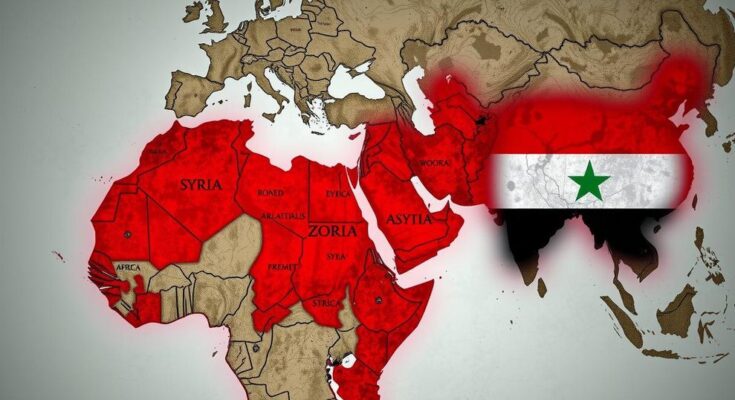President Vladimir Putin faces setbacks in Africa as Sudan and Libya resist Russian military presence. Sudan declined a naval base request due to Western backlash fears, while Libya’s Prime Minister Dbeibeh asserted that his country will reject unauthorized foreign troops, indicating growing resistance to Russian influence in the continent amidst the chaos following Assad’s regime collapse in Syria.
In a significant setback for President Vladimir Putin, two of his allies in Africa are resisting Russian military influence in their nations, particularly following the dissolution of Bashar al-Assad’s regime in Syria. Sudan has declined Russia’s request to build a naval base on its Red Sea coast, with Sudanese intelligence suggesting that concerns regarding potential backlash from the West were crucial in this decision. Additionally, Libyan Prime Minister Abdul Hamid Dbeibeh has declared that Libya will reject any unauthorized foreign military presence, stating, “No patriotic person accepts the entry of a foreign country and imposing its hegemony.”
These developments pose a severe threat to Russia’s aspirations to maintain a robust foothold in Africa amid the changing geopolitical landscape post-Assad. Previous ambitions included establishing a naval base in Sudan since 2019; however, ongoing civil strife has postponed these plans indefinitely, while recent assertions by Libyan authorities further complicate Russia’s regional strategy. Reports indicate that Russia is contemplating a partial withdrawal from Syria and an emphasis on strengthening relations with allies in the Maghreb and northeast Africa to counterbalance losses elsewhere.
The instability following Assad’s exit raises doubts about Russia’s military engagements in the Middle East, specifically regarding crucial installations like the Tartus naval base. Amid international scrutiny, Russian military assets may be redirected from Syria to Libya, with U.S. and Libyan officials alleging that Moscow is currently transferring military resources to support factions in Libya.
The Kremlin maintains that it is engaging with Syria’s emerging leadership to secure its military outposts, which are facing new challenges. This shift in focus towards Africa is further complicated by Libya’s explicit rejection of any unauthorized military presence. The outcome of these developments will significantly affect Russia’s capacity to exert its influence in the region, especially as tensions related to the Ukraine conflict persist.
The geopolitical dynamics involving Russia in Africa have been marked by attempts to bolster military presence through strategic agreements and military cooperation. In light of shifting allegiances and regional instability, particularly following significant events like the Assad regime’s collapse in Syria, Russia has encountered resistance in its efforts to expand its military infrastructure in Africa. Sudan and Libya, both of which hold strategic importance, have demonstrated a willingness to resist Russian military overtures, significantly impacting Moscow’s influence in the region and its broader strategic objectives.
In conclusion, the dual pushback from Sudan and Libya against Russian military advances signals a notable decline in Moscow’s influence in Africa. The potential collapse of Russian positions in Syria and resultant reevaluation of strategy in Africa could hinder its capabilities in maintaining a robust military presence. As political dynamics evolve in the region, the implications of these developments will only deepen the challenges facing Russia’s foreign policy and military aspirations.
Original Source: www.newsweek.com




